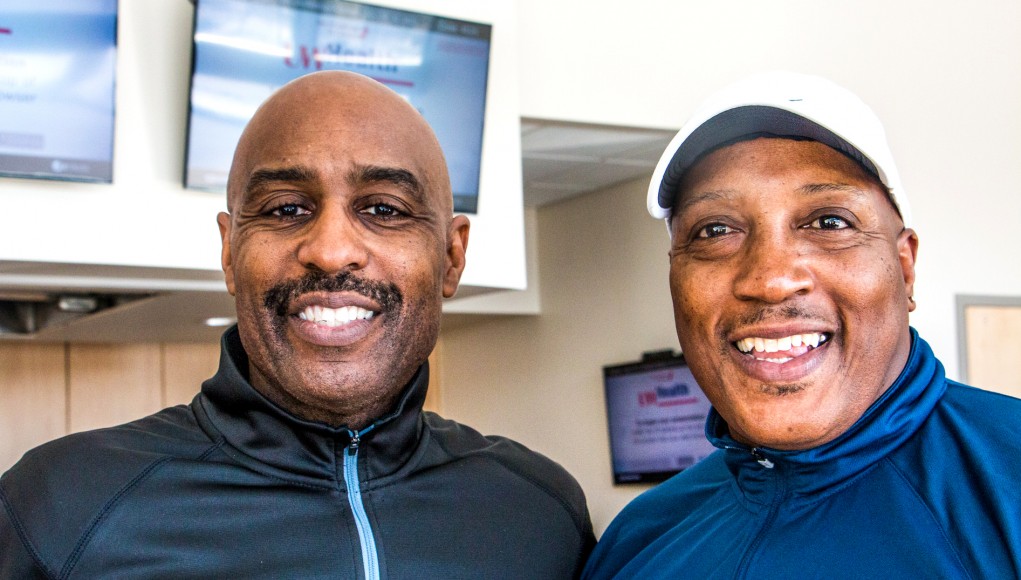![]() Standing on a scale in his bare feet Beau Nelson is taking his first step toward a New Year’s resolution. This special device operated by a technician at the new UW Health facility at the American Center measures a subject’s Body Mass Index or BMI. A calculation of his current percentage of body fat, relative to his height and weight, this bit of information can help Nelson, 19, begin setting goals to improve his overall health and fitness.
Standing on a scale in his bare feet Beau Nelson is taking his first step toward a New Year’s resolution. This special device operated by a technician at the new UW Health facility at the American Center measures a subject’s Body Mass Index or BMI. A calculation of his current percentage of body fat, relative to his height and weight, this bit of information can help Nelson, 19, begin setting goals to improve his overall health and fitness.
“I wanted to see how healthy I am,” he said. “I put on about 20 pounds being in the jail for 15 months.”
On a work release furlough from the Dane County Jail, Nelson took advantage of an ambitious program which aims to help area residents better navigate the health care system. Organized by the Rebalance-Life Wellness Association, the day’s events specifically targeted the one demographic most in need of guidance when it comes to making positive life choices.
“African-American men are in trouble with the health disparities,” said founder Arron Perry. “Research shows that when African-American men make a New Year’s resolution, they’re good for 35 to 60 days. So I wanted to create an event where we could get the guys together and point out the importance of what we’re trying to do, which is to stay healthy. And what we want to do is to keep them together all year.”

Called “We’re Off to a Good Start,” Perry’s event, now in its second year, welcomes black men to learn about the information and professional resources available for them to optimize their physical activity and nutrition. They also receive tips on how to reduce their emotional stress and build supportive relationships with physicians and other health care providers. The objective of this program is to create a culture of community engagement so that every participant can enjoy an ongoing series of events and interactions that encourage their best efforts.
“I tell people that the difference between my event and others is we’re not a one-and-done,” Perry said. “We do this event today, and next week we start our cooking classes. The month after that, we’re launching Black Men Run. Then in May, we’ll be doing the Soul Stroll. The goal is keeping people together and building that brotherhood. Because we know that when that a brotherhood is formed, people are more likely to follow through.”

Participants at the event received presentations from guest speakers who offered advice on all aspects of healthy living. From triathlon training to financial literacy, conversations throughout the day centered on the importance of strength and stability in daily life. At risk from a variety of negative health outcomes ranging from obesity to high blood pressure and diabetes, African-American men are most likely to experience chronic illness or premature death. With the added disadvantage of the nation’s highest rate of incarceration, Wisconsin residents like Nelson need assistance if they’re going to beat the odds stacked against them.
“I learned a lot today,” Nelson said. “What really got to me was Darryl Davidson when he was talking about the suicide rates and how black men only live to 69 on average and how white women live to 75. They say men die sooner than women and I wonder why.”

Darryl Davidson, the administrator of the Men’s Health Referral Network in Milwaukee, spoke passionately about the critical value of sharing wellness information with like-minded individuals and medical professionals. He hopes that black men in particularly can learn to talk openly about the wellness issues that might be troubling them.
“That means taking personal responsibility for knowledge of our own bodies and knowing when your body or parts of your life are not going well. It means having a relationship with a physician or a health care institution,” Davidson said. “It’s these relationships that can assist you and enhance your information. A relationship is almost more important than anything else because that person should be the individual who you can count on and trust.”

Both Perry and Davidson agree that no one should expect to make these major healthcare and lifestyle choices on their own. They recognize that as part of a community, individuals can better monitor their own wellness and help to support that of others. By working as well to overcome economic and educational disparities, they believe that anyone can achieve and maintain better health outcomes. Ultimately, Perry said, he intends to reverse the trend that leaves African-American men in Madison so vulnerable to illness.
“We want to make Wisconsin the healthiest state for black men to live in the Midwest and it starts with Dane County,” he said. “It’s amazing how when you start something like this, it spreads to other communities and we’re serious about getting the message out there.”










